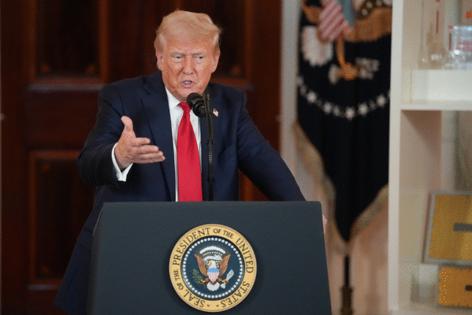Trump barely defeats challenge to his tariff war in Senate
Published in News & Features
WASHINGTON — Donald Trump barely repelled a challenge to his global tariff offensive in the Republican-controlled U.S. Senate as the president’s trade policy stokes public fears of inflation and recession.
The Senate tied 49-49 in a Wednesday vote on a resolution to end the barrage of import taxes the president announced earlier this month on China and most other U.S. trading partners. Under Senate rules, the measure failed because of the tie.
Two critics of Trump’s tariff war were absent, Democrat Sheldon Whitehouse of Rhode Island and Republican Mitch McConnell of Kentucky.
Three Republican senators crossed party lines to join all Democrats in supporting the resolution
The resolution’s impact would have been primarily symbolic since Trump had vowed to veto it anyway.
Polls show a majority of Americans already oppose Trump’s tariffs, with 55% calling them bad policy in a CNN poll taken in mid-April. Consumer sentiment is plunging and fears of recession and inflation are rising. A 59% majority said Trump’s policies have worsened economic conditions, up from 51% in March and on par with the poorest readings Joe Biden saw during his presidency.
The Senate resolution would drastically lower Trump’s 145% tariff on China and end the duties against other nations he announced on April 2, which he dubbed “Liberation Day.” The resolution doesn’t cover tariffs Trump announced in February against China, Canada and Mexico, citing fentanyl trafficking.
The April tariff announcement unleashed turmoil in financial markets and the president backtracked, saying he would delay the full tariffs for 90 days while he allows negotiations to take place. In the interim, imports from most countries face a baseline tariff of 10%, though the full tariff continues on Chinese goods.
The Senate earlier this month passed a resolution to eliminate tariffs Trump announced in February against Canada, though the president also said he would veto that measure if it reaches his desk.
McConnell and Whitehouse supported that resolution, as did the three Republican senators who voted on Wednesday to end the global tariffs: Rand Paul of Kentucky, Susan Collins of Maine and Lisa Murkowski of Alaska.
U.S. Trade Representative Jamieson Greer went to the Capitol a day ahead of the vote to rally support for Trump’s trade offensive at a luncheon with Republican senators. Greer emphasized the president’s efforts to use higher tariffs as leverage to forge new trade deals with other nations but was light on specific details on how the negotiations are progressing, according to senators who attended.
The Republicans told Greer they wanted trade deals to be rolled out as soon as possible, Senator Kevin Cramer of North Dakota said.
“People are very anxious. They want to see the results of the strategy here,” added Cramer, who voted against the resolution to end the tariffs.
The president has granted reprieves for some industries, including automobiles. Trump signed an executive order preventing duties on foreign-made vehicles from stacking on top of other levies and lessening charges on parts from overseas used to make vehicles in the U.S.
Trump blamed Biden for the stock market turmoil this month in a speech Wednesday, saying the downturn has “nothing to do with tariffs.”
The U.S. economy contracted at the start of the year for the first time since 2022 on a monumental pre-tariffs import surge and more moderate consumer spending, a first snapshot of the ripple effects of the trade policy.
Sign up for the Washington Edition newsletter to find out how the worlds of money and politics intersect in the US capital.
(Updates with additional detail and context beginning with third paragraph)
©2025 Bloomberg L.P. Visit bloomberg.com. Distributed by Tribune Content Agency, LLC.







Comments